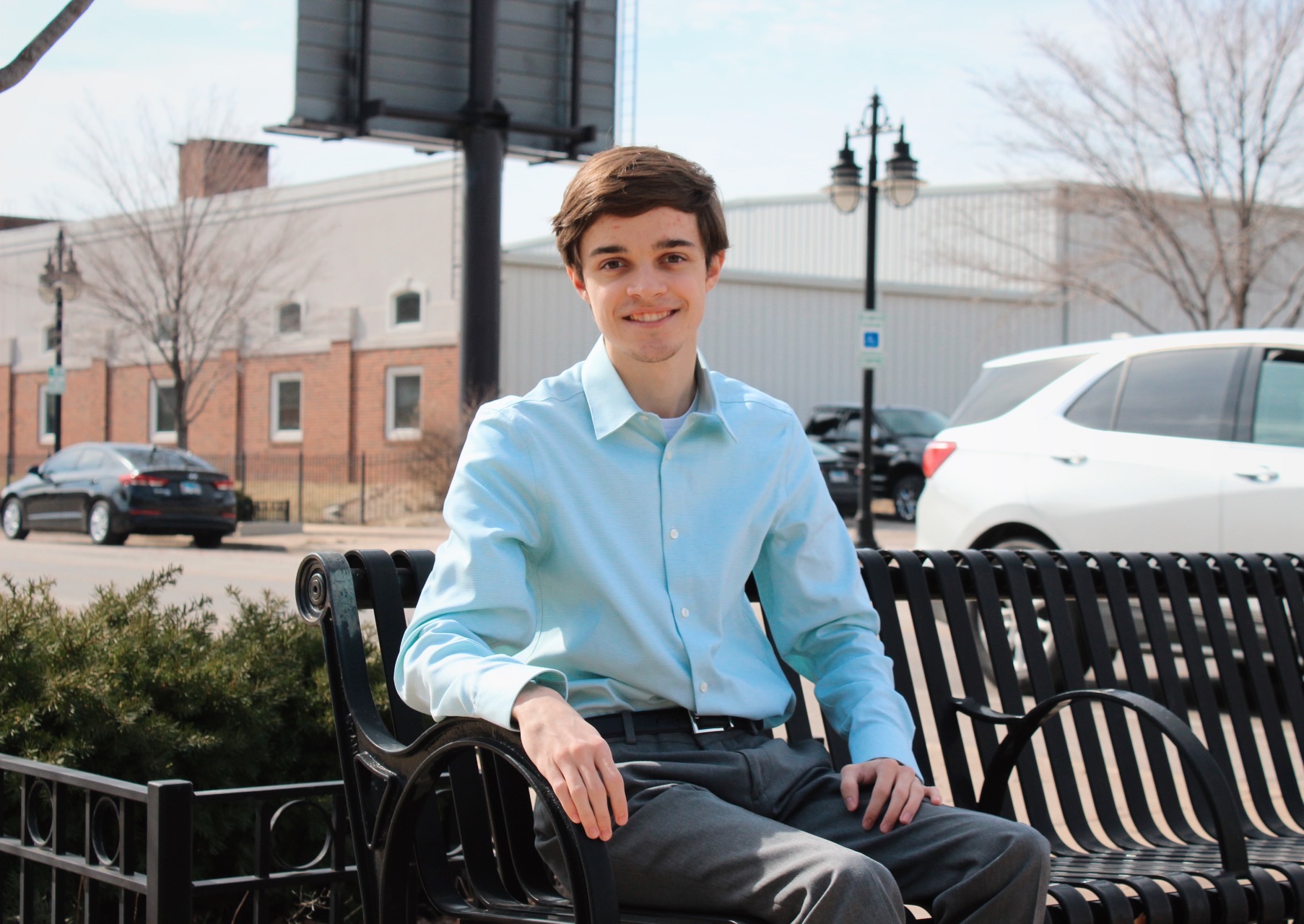
Evan Michael Matthews is a masters student in computer science at the University of Illinois Urbana-Champaign. His research focuses on audio computing and AI/ML, more specifically the improvement of AI audio generation and lossless translation between sheet music and audio. He is a member of the CS Audio Lab, under thesis advising from Paris Smaragdis and additional research guidance from Minje Kim.
Evan picked up interests in music when he began learning to play piano and clarinet at age 12. In high school, he participated in the MTHS Wind Ensemble, which performed at the Illinois SuperState Concert Band Festival (2016, 2018, 2019), the Chicago Field Museum (2016), and the Illinois Music Education Conference (2019). He also took second place in the 2018 and 2019 ILMEA Composition Tracks for his solo piano works, and performed with the 2019 ILMEA All-State Band on clarinet.
Evan continued composing as an undergraduate student at the University of Illinois Urbana-Champaign, where he delved into experimental and computer music, participated in the UIUC Electronic Music Studios (EMS), and studied under Stephen Andrew Taylor, Reynold Tharp, Heinrich Taube and Eli Fieldsteel. As a graduate student, he continues to compose in his free time, where is focus has shifted to microtonal theory and performance.
Education
University of Illinois Urbana-Champaign -> 2023-Present
M.S. Computer Science
Urbana, ILUniversity of Illinois Urbana-Champaign -> 2019-2023
B.S. Computer Science + Music with High Honors
Urbana, ILMetamora Township High School -> 2015-2019
Metamora, IL
Graduate Projects
MS Thesis: Text-to-Audio Generation Improvement through Text Recaptioning
Year: Present (in progress!)
Advisor: Paris Smaragdis
I am actively working on my thesis as part of the MS CS program at UIUC, for a deposit deadline of early May 2025.
A Case for Bayesian Grading
Year: May 2024
Collaborators: Yuxuan Chen, Chenyan (Victor) Zhao
Advisors: Craig B. Zilles, Matthew West
Tools: Python, Jupyter Notebook
Research project for CS 500: Topics in Computer Education Research. Simulating student grades as bayesian probabilities for analysis on trustworthiness. A combination of proctored (UIUC CBTF) and non-proctored scores were used in the simulation process. Accepted to SIGCSE Virtual 2024!
Optical Music Recognition for LilyPond File Generation
Year: May 2024
Professor: Svetlana Lazebnik
Tools: Python, Jupyter Notebook
Graduate project for CS 444: Machine Learning for Computer Vision. Analysis of state-of-the-art work in Optical Music Recognition (OMR) with respect to several digital music notation formats. LilyPond is deemed to be a reasonable format for use in OMR given its current structure and underlying functionality for batch exporting.
Nearest Neighbor Classification for Classical Image Upsampling
Year: November - December 2023
Collaborator: Nic Prate
Professor: Paris Smaragdis
Tools: Python, Jupyter Notebook
Research project for CS 545: Machine Learning for Signal Processing. Explores the use of K-Nearest-Neighbors Interpolation for the purpose of image upsampling. Implementation expanded to include dynamic aspect ratio upsampling and selective upsampling to reduce computation time for images with solid-color regions.
Personal Website
Year: May 2023
Tools: HTML, CSS, Markdown, Github Pages
Built with Hugo and designed using the XMIN theme. Read more about my journey through web development here.
Undergraduate Projects
Senior Capstone: Transcribing Monophonic Audio with Deep-Learning Data
Year: Spring 2023
Advisor: Zuofu Cheng
Tools: MIDI/MusicXML, MuseScore, Python
Combined senior capstone project with Kevin Zhou. Our main goal was to implement a machine-learning model for rudimentary conversion of raw audio recordings into readable sheet music. I created the database of examples to be recorded and handled the business side of the study, and Kevin put together the webapp SingSong for collecting recording data.
Absentea
Year: Spring 2022
Collaborators: Majeed Akinlusi, Zeyang “Hans” Zhang, Kevin Zhou
Tools: React.js, SQL
Final project for CS 411; database webapp designed for comparing schedules and absences between members of an organization or group. Inspiration taken from scheduling sites like When2meet and Doodle.
DISSCO
Year: Fall 2021 - Spring 2022
Director: Sever Tipei
Collaborators: Tejus Kurdukar
Tools: C++
DISSCO, or Digital Instrument for Sound Synthesis and Composition, is a Linux-based program combining music composition and sound synthesis for the easier creation of stochastic and non-stochastic music.
Disklavier Echo Effect
Year: Fall 2021 - Spring 2022
Director: Heinrich Taube
“This is a course project for MUS 305 at the University of Illinois Champaign-Urbana, under the course direction of Dr. Heinrich Taube. This project aims to simulate an “echo” effect on a Yamaha Disklavier piano, on up to 16 key simulatenously, with repetitions and diminishing of echo sound up to the performer. The program runs using the musx library and uses threading to run real-time outputs to a Yamaha Disklavier.”
Pan-Lang
Year: Spring 2020
Collaborators: Renzo Ledesma, Katie Saunders, Kevin Zhou
Second prize winner at PYGHACK 2020: a food pantry webapp designed providing translated lists and descriptions to patrons of Champaign and Urbana-area foodbanks.
Spotigraph
Year: Fall 2020
Collaborators: Beth Fineberg, Cale Wolf, Kevin Zhou
Tools: C++, Spotify API
Final project for CS 225; makes use of graph traversal algorithms to find the kth degrees of a given Spotify artist.
WarioWare!
Year: November - December 2019
Collaborator: Kevin Zhou
Tools: Java, Android Studio
Final project for CS 125: Intro to Computer Science, (now CS 124: Intro to Computer Science I). Android app consisting of several minigames in the style of Nintendo’s WarioWare. Players are rewarded with coins which they can use to purchase trophies (Bitmojis of the CS 125 course staff). This app made the list of “Impressive Projects” at the CS 125 Final Project Fair.
Fun Facts
- I am a fourth generation alumni of the University of Illinois, (Gomer Bath, BA Journalism; Mary Frances Matthews, BALAS Religion; Paul Matthews, MS Chemical Engineering; and me!)
- My Erdős number is 4.